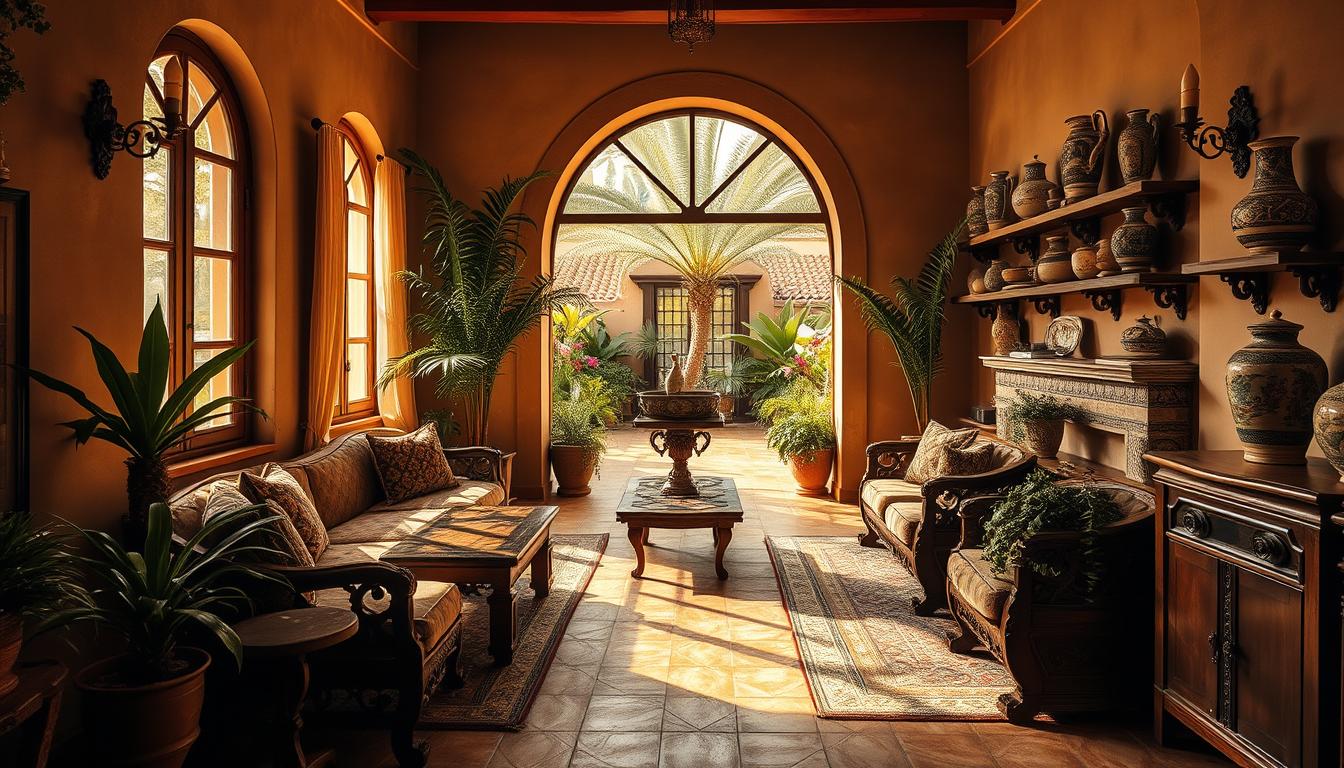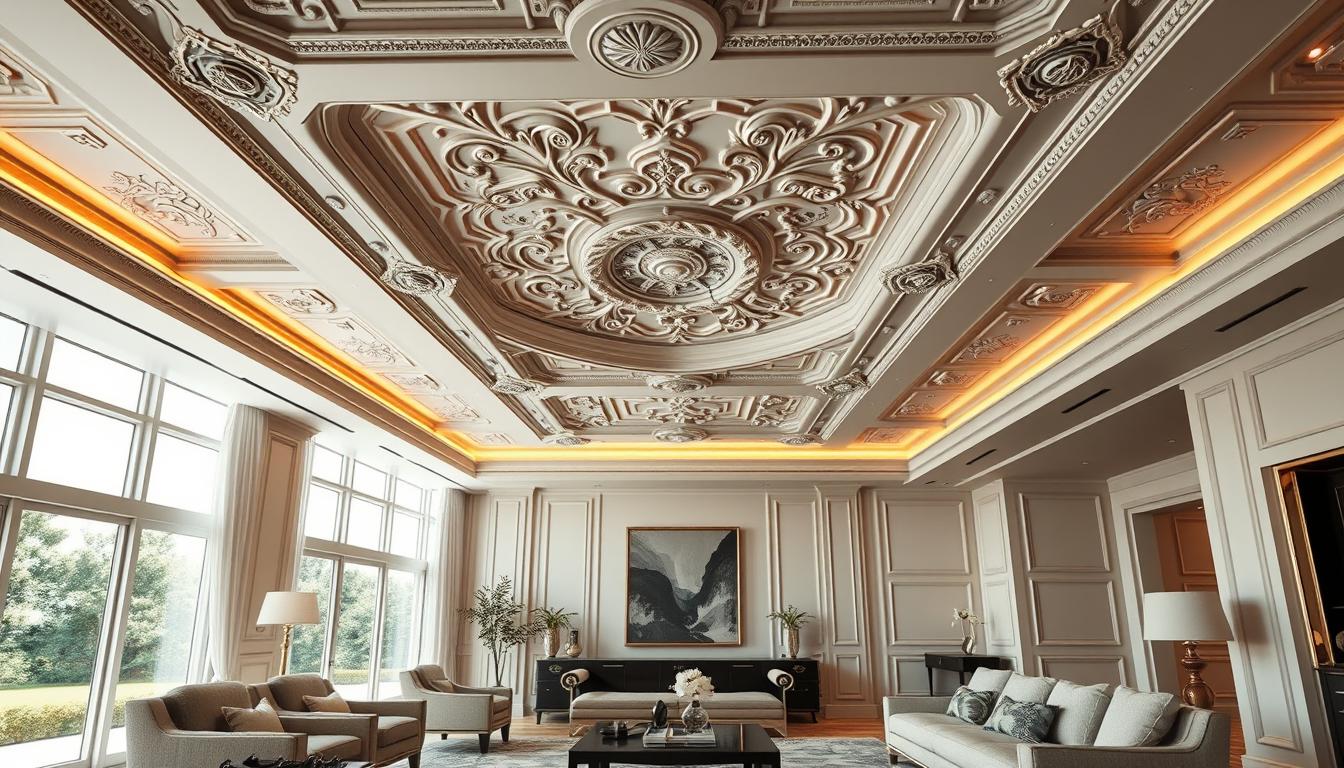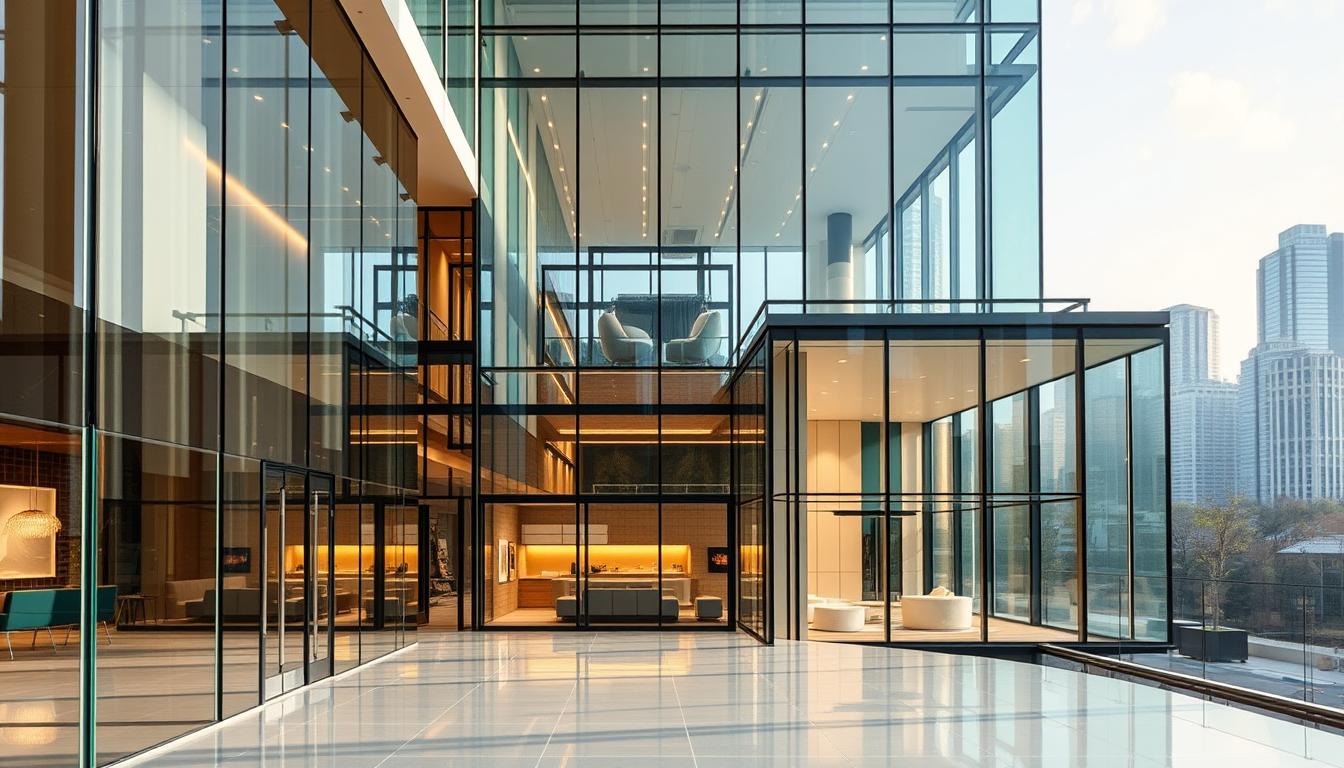Mediterranean style is warm and inviting. It’s become a favorite in modern decor. Its appeal is still strong today.
This style is known for warm colors, textured surfaces, and rustic touches. It adds warmth and charm to any living space.
To create a Spanish-inspired interior, use terracotta tiles and wrought iron accents. Also, add statement lighting fixtures. We’ll show you how to bring this style into your own home.
Key Takeaways
- Warm color palettes and textured surfaces are key to creating a Mediterranean-inspired interior.
- Rustic elements, such as terracotta tiles and wrought iron accents, add character to a room.
- Statement lighting fixtures can elevate the overall aesthetic of a Spanish-inspired space.
- Incorporating natural materials can bring warmth and coziness to a room.
- Balancing different textures and elements is crucial to achieving a harmonious Mediterranean-inspired interior.
Introduction to Spanish Home Interior Design
Spanish home interior design is known for its warm and welcoming feel. It’s a favorite for those wanting a cozy yet elegant home. This style draws from the Mediterranean culture and Spain’s rich history and architecture.
Exploring modern Spanish interior design, we see it’s more than just looks. It’s about creating a warm and welcoming space. Rich colors, textured surfaces, and rustic elements are key to this style.
Spanish interior design is special because it mixes old and new. This mix creates a unique and eye-catching look. It’s why Spanish home interior design is loved by those who want a style that’s both classic and modern.
To create a space that feels like Spain, use warm colors, textured surfaces, and rustic accents. Whether you want a full makeover or just a hint of Spanish flair, knowing this style is a great start.
Key Characteristics of Spanish Interior Design
Spanish interior design combines warmth with elegance, making spaces cozy and unique. It draws from Moorish, Gothic, and Mediterranean styles, showing the country’s rich culture.
Several elements make Spanish design warm and welcoming. These include warm colors, textured surfaces, and rustic touches. Each adds to the space’s beauty and feel.
Warm Color Palettes
Warm colors are a key feature of Spanish design. Shades like terracotta, sienna, and golden hues create a cozy feel. These colors are used on walls, floors, and furniture to make spaces inviting.
To bring warmth to your home, use terracotta tiles and warm wood. Choose earthy hues for walls and accents.
Textured Surfaces
Textured surfaces add depth and interest to rooms. In Spanish design, this is achieved with rough wood, intricate tiles, and woven textiles.
To add texture, include wooden beams, hand-painted tiles, and plush textiles. Wool blankets and throw pillows work well.
Rustic Elements
Rustic elements are essential in Spanish design. Distressed wood, vintage items, and handmade pieces add history and charm. These elements often have an old-world feel.
| Element | Description | Example |
|---|---|---|
| Distressed Wood | Wooden furniture or flooring with a distressed finish, adding a rustic touch. | Reclaimed wood beams |
| Vintage Pieces | Antique furniture or decorative items that add character and history. | Old wooden chests, vintage ceramics |
| Handcrafted Items | Items made by hand, such as textiles, pottery, and woodwork, adding a personal touch. | Hand-painted ceramics, woven baskets |
By using these elements, you can create a Spanish-inspired home. Warm colors, textured surfaces, and rustic elements all contribute to the Spanish style.
Furniture Styles for Spanish Interiors
The right furniture can make your home feel like a Spanish luxury. Choosing the right furniture is key to a Spanish-inspired look. It makes your home feel welcoming and inviting.
Dark Wood Furniture
Dark wood furniture adds elegance to Spanish interiors. Intricately carved wooden cabinets and tables are typical. They show off traditional Spanish craftsmanship.
These pieces are not just for storage. They are also eye-catching. Pick dark wood furniture that matches your Spanish style.
Upholstered Pieces
Upholstered pieces like plush sofas add comfort to Spanish interiors. Luxurious fabrics like velvet and leather are favorites. They add a rich feel that goes well with dark wood.
Think about the colors when picking upholstered pieces. Choose colors that fit your Spanish design. Earthy tones and bold colors work well together.
Ironwork Accents
Ironwork accents like wrought iron lamps add drama to Spanish interiors. They help tie the room together. This creates a sense of unity.
Wrought iron furniture is both useful and decorative. It adds sophistication. But, use ironwork accents wisely to avoid clutter.
Essential Materials in Spanish Design
Spanish interiors are famous for their rich textures and materials. These elements create a warm and inviting atmosphere. The authentic materials add warmth and elegance, making any space feel truly Spanish.
Terracotta Tiles
Terracotta tiles are a key part of Spanish design. They add a warm, earthy tone to floors and walls. Their natural beauty and rustic charm make spaces cozy and inviting.
As design experts note, terracotta tiles help blend indoors with outdoors. This is a common feature in Spanish architecture.
These tiles are not only beautiful but also durable and practical. They work well in kitchens and courtyards, adding Spanish charm.
Wrought Iron
Wrought iron is essential in Spanish design, known for its intricate details and ornate patterns. It brings elegance and sophistication to any room. Wrought iron is used in furniture, lighting, and decorative accents, adding history and culture.
Interior designers say wrought ironwork is a Spanish design hallmark. It offers craftsmanship hard to match with modern materials. Its durability and versatility make it a favorite for both function and decoration.
Handcrafted Textiles
Handcrafted textiles, like woven baskets and embroidered linens, are key to Spanish design. They add warmth and humanity, making spaces feel inviting and personal. These textiles often have traditional patterns and motifs of Spanish craftsmanship.
| Material | Characteristics | Uses in Spanish Design |
|---|---|---|
| Terracotta Tiles | Warm, earthy tones; natural beauty; durability | Floors, walls, kitchens, courtyards |
| Wrought Iron | Intricate details; ornate patterns; elegance | Furniture, lighting, decorative accents |
| Handcrafted Textiles | Traditional patterns; warmth; humanity | Upholstery, linens, baskets, wall hangings |
Using these essential materials in your design can create a space that feels warm and elegant, like Spanish style. Whether you’re renovating your home or just adding decor, terracotta tiles, wrought iron, and handcrafted textiles will add Spanish charm.
Color Schemes that Work for Spanish Styles
The color scheme is key in Spanish interior design. It offers many options for different styles and tastes. Choosing the right color can greatly change your home’s feel.
In Spanish home design, earthy tones are a must. They bring warmth and coziness to any room. These colors are pleasing to the eye and make spaces feel comfortable and relaxing.
Earthy Tones
Earthy tones like terracotta, sienna, and umber are popular for Spanish interiors. They remind us of the Spanish countryside. These colors make spaces feel warm and welcoming.
Benefits of Earthy Tones:
- Creates a warm and cozy ambiance
- Complements rustic and traditional decor
- Can be paired with bold accent colors for contrast
Here are some ways to use earthy tones effectively:
| Color | Hex Code | Description |
|---|---|---|
| Terracotta | #E67E73 | A warm, earthy red tone |
| Sienna | #A0522D | A reddish-brown color |
| Umber | #964B00 | A dark, earthy brown tone |
Bold Accent Colors
Bold accent colors can add a vibrant touch to Spanish-inspired interiors. Turquoise and crimson are great choices for adding color.
Using Bold Accent Colors Effectively:
- Use sparingly to avoid overwhelming the space
- Pair with neutral backgrounds for contrast
- Can be incorporated through accessories and decor
Mixing earthy tones with bold colors creates a welcoming atmosphere. This mix honors Spanish design’s rich heritage while adding a modern twist.
Incorporating Patterns and Textures
Designing a Spanish-inspired home means mixing patterns and textures. This mix adds depth and interest to a room. It makes the space feel layered and complex.
In Spanish interiors, you’ll see a blend of tile patterns and textile layers. This blend creates a cozy, inviting space. Let’s look at how to add these elements to your home.
Tile Patterns
Tile patterns are a key feature of Spanish design. They often include intricate mosaics and geometric designs. These patterns bring elegance and sophistication to any room.
- Use terracotta tiles for a warm kitchen or bathroom.
- Try mosaic patterns for your backsplash or flooring.
- Geometric tiles can make a statement wall or accent piece.
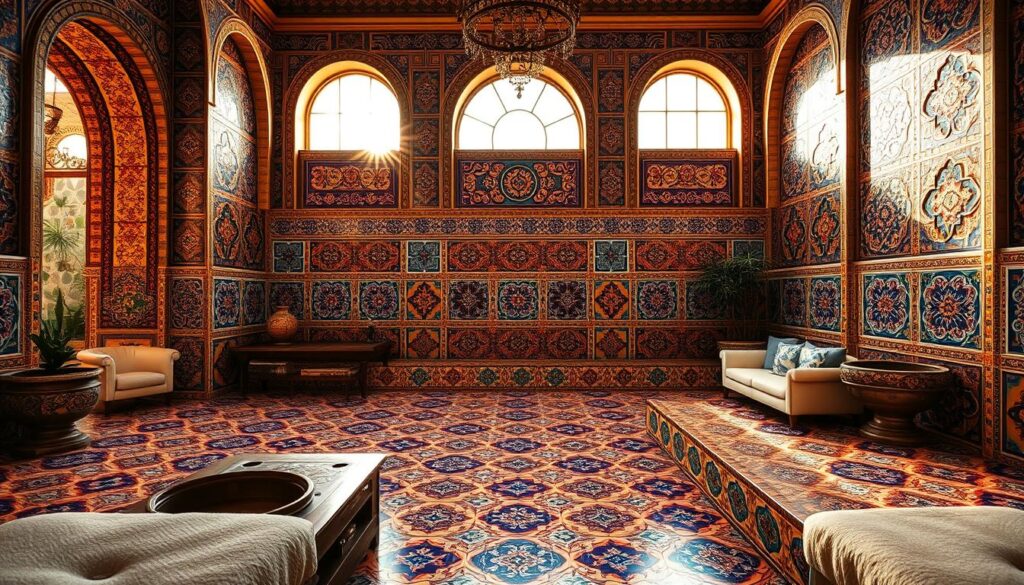
Textile Layers
Textile layers are vital in Spanish interiors. They add warmth and coziness. Mix woven blankets, embroidered linens, and plush rugs for a layered look.
“The use of rich textiles is what makes a house feel like a home. It’s about creating a sense of warmth and comfort that invites you to relax and unwind.”
To achieve this layered look, mix different textures and patterns. Try:
- Woven baskets and rattan furniture for a natural feel.
- Embroidered linens and patterned fabrics for elegance.
- Plush rugs and throw blankets in rich colors for depth and warmth.
By mixing patterns and textures, you can create a Spanish-inspired interior. It will feel rich, inviting, and full of character. Whether you love the tile work or the textiles, mediterranean home decor is charming.
The Role of Lighting in Spanish Interiors
The right lighting can make a room feel warm and inviting, like a Spanish-style retreat. Lighting is key to light up the space and make Spanish-style furniture and decor look better.
In Spanish interior design, mixing natural and artificial light is important. It helps create a welcoming atmosphere. Let’s see how to add lighting to your Spanish-inspired home.
Natural Light Integration
Using natural light is a big part of Spanish interior design. Big windows, skylights, and glass doors let in lots of sunlight. This cuts down on the need for artificial light during the day.
It also saves energy and shows off the beauty of rustic Spanish design like terracotta tiles and wooden beams.
To get more natural light, use sheer curtains or blinds. They let sunlight in while keeping things private. This makes your home bright and airy, showing off your Spanish-style furniture well.
Statement Lighting Fixtures
When natural light isn’t enough, statement lighting fixtures are the answer. Wrought iron chandeliers, pendant lights, and sconces are popular in Spanish design. They light up the room and add to its look.
For a real Spanish feel, pick lighting with detailed metalwork or traditional Spanish designs. This will make your room look cohesive with your rustic Spanish design pieces.
By mixing natural light with statement lighting, you can make your Spanish-inspired home warm and inviting. This balanced lighting approach will highlight your decor and make your space elegant and welcoming.
Outdoor Spaces and Spanish Design
Spanish design smoothly connects indoor and outdoor areas, making living more enjoyable. Outdoor spaces in homes inspired by Spain are designed to be beautiful and functional. They focus on comfort and beauty.
“The courtyard is the heart of the Spanish home,” experts say. This shows how important outdoor spaces are in Spanish design. These areas are filled with greenery, fountains, and special furniture. They create a calm atmosphere perfect for relaxing.
Courtyards and Patios
Courtyards and patios are key in Spanish outdoor design. They are often closed, making them cozy and private. To get this look, use terracotta tiles and wrought iron accents, typical of Mediterranean decor.
Make a courtyard or patio a cozy spot with comfy seats, soft lights, and greenery. For a modern Spanish look, mix old and new furniture.
Garden Design Elements
Garden design in Spanish homes reflects the Mediterranean climate and culture. Olive trees, citrus plants, and herbs make gardens lush and welcoming. Terracotta pots and planters add warmth and authenticity.
Adding a water feature, like a small fountain, enhances your outdoor space. The sound of water creates a peaceful atmosphere, ideal for unwinding.
Designing your outdoor space with Spanish-inspired elements connects indoor and outdoor areas. This improves your living experience.
Accessories and Decor for a Spanish Feel
When it comes to luxury Spanish interiors, the details matter a lot. This is true for accessories and decor. They are key to making your space feel like a real Spanish home.
The right decorative pieces can make your space feel more like a traditional Spanish home. Hand-painted ceramics and artwork/sculptures are great for adding character.
Hand-Painted Ceramics
Hand-painted ceramics are a big part of Spanish craftsmanship. They add warmth and personality to any room. You can use them as vases, plates, or decorative accents.
- Look for vibrant colors and intricate designs that reflect Spanish artistry.
- Use them as centerpieces or wall decor to add visual interest.
- Mix and match different patterns and styles to create a unique look.
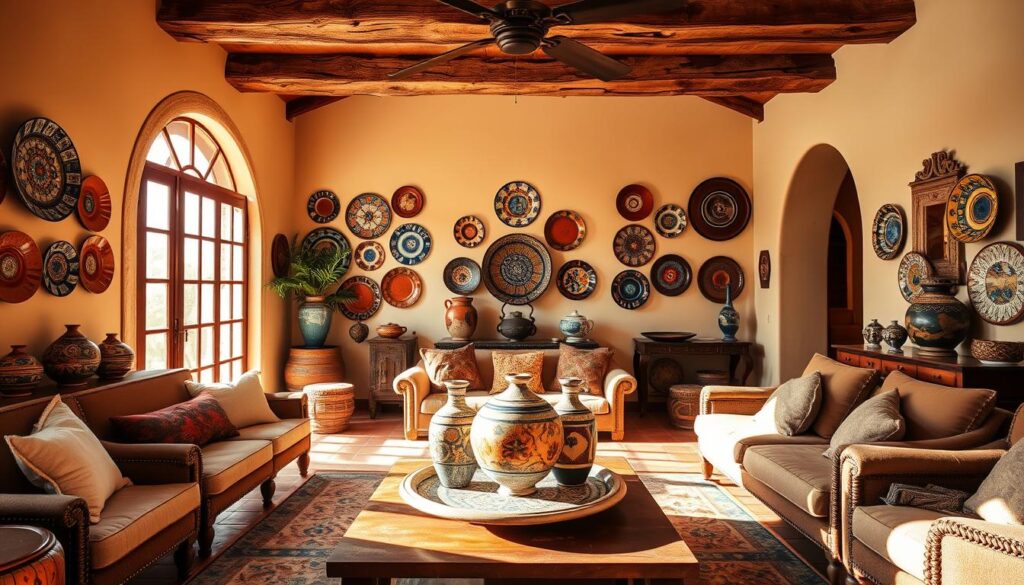
Artwork and Sculptures
Artwork and sculptures are key in Spanish home design. They add depth and sophistication. From metalwork to wooden carvings, they can be focal points.
When picking artwork and sculptures, consider a few things:
- Choose pieces that show Spanish culture, like works by Spanish artists or traditional motifs.
- Think about the size of the artwork compared to your room.
- Use different materials and textures to make your space visually appealing.
By adding these decorative elements, you can make a Spanish-inspired interior that’s both luxurious and authentic.
Creating a Cozy Atmosphere
Spanish homes are known for their warm, welcoming feel. This can be achieved by layering textiles and using soft furnishings. It’s important to understand how different elements contribute to a cozy space.
Layering textiles is key in creating a cozy Spanish-inspired interior. Mixing materials and textures adds depth and warmth. For example, throw blankets made from natural fibers like wool or cotton can make a space feel cozier.
Layering Textiles
Layering textiles is an art that combines different textures and patterns. Start with a plush area rug as the base. Then, add throw blankets, pillows, and other soft furnishings. It’s important to balance textures like smooth leather, soft velvet, and chunky knits for a rich atmosphere.
For instance, a rustic Spanish design wooden coffee table paired with a velvet sofa and a chunky knit throw blanket makes a cozy living room. Adding Mediterranean home decor elements, like hand-woven baskets and intricately patterned tiles, also warms up the space.
| Textile | Description | Effect on Ambiance |
|---|---|---|
| Throw Blankets | Made from natural fibers like wool or cotton | Adds warmth and coziness |
| Plush Rugs | Soft underfoot, available in various textures | Creates a comfortable base layer |
| Velvet Pillows | Soft, luxurious fabric | Adds a touch of elegance and comfort |
Using Soft Furnishings
Soft furnishings are crucial in creating a cozy atmosphere. Choose upholstered furniture for both comfort and style. Plush pillows and soft throws can make these pieces even cozier.
When picking soft furnishings, think about color and texture. Earthy tones and natural materials are typical of Spanish design. For example, a terracotta-colored sofa with cream-colored pillows and a natural fiber rug can make a cozy living area.
By carefully layering textiles and using soft furnishings, you can make your Spanish-inspired home cozy and inviting. This approach not only beautifies your space but also makes it a comfortable place for relaxation and socializing.
Sustainable Practices in Spanish Design
Spanish design now focuses on being green. It mixes old styles with new eco-friendly ideas. This shows that going green is key in making a modern Spanish interior.
Using eco-friendly materials is a big part of this. Think about using reclaimed wood, green textiles, and local materials. For example, choosing Spanish style furniture made from green wood helps the planet. It also makes your space special.
Eco-Friendly Materials
Green materials are essential in Spanish design. Things like terracotta, natural stone, and clay are good for the planet. They also make a space feel warm and real, as design experts say.
- Reclaimed wood for furniture and flooring
- Sustainable textiles, such as organic cotton and linen
- Locally sourced materials to reduce carbon footprint
Upcycling Furniture
Upcycling furniture is also a great way to go green. It means making new furniture from old stuff. For instance, turning an old door into a coffee table or making a mosaic from vintage tiles is creative and saves waste.
“Upcycling is not just about reducing waste; it’s about creating something new and beautiful from what would be thrown away.” – Design Expert
By using green materials and upcycling, you can make a modern Spanish interior that looks great and is good for the planet. Whether you’re setting up a new place or redoing an old one, these steps help you get a beautiful, green Spanish style furniture look.
Conclusion: Bringing Spanish Charm into Your Home
Creating a Spanish-inspired interior is all about warmth and charm. Use warm colors, textured surfaces, and rustic elements. This will make your home cozy and inviting.
To get a luxury Spanish look, mix dark wood furniture, upholstered pieces, and ironwork. Use terracotta tiles, wrought iron, and handcrafted textiles. These add depth and authenticity to your design.
Embracing these elements and sustainable practices makes your space beautiful and eco-friendly. This guide should inspire you to add Spanish charm to your home.
